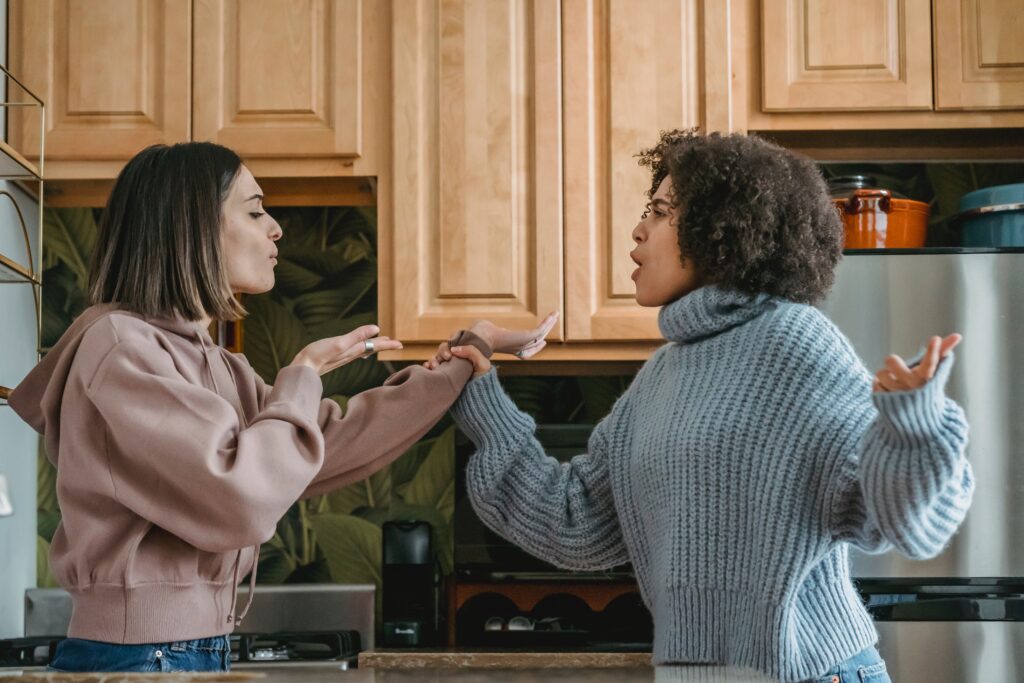5 Ways You Unintentionally Ruin Your Relationships

Our experiences help shape who we are, but with those experiences come baggage, unconscious patterns, and beliefs that are sometimes hard to shake off. Especially if you are not aware of them.
When you enter a relationship your partner accepts that you have that baggage and you accept that your partner also has their own problems to deal with. There is an unspoken agreement in which both of you will work on not harming the other with those kinks that each one has.
Trouble comes when those unconscious patterns or actions are not seen, are not dealt with, and are let loose causing harm to each other and the relationship. Of course, unconscious behaviors are difficult to pinpoint so we at Psych2Go have compiled a list of 5 things that you unknowingly may be doing, that ruin your relationships.
Before we begin, this article is intended for educational and information purposes only. It is not intended to diagnose or treat anything. If you need help or advice please reach out to a mental health or marriage and relationship professional.
Now, here are the 5 ways you unintentionally ruin your relationships.
1- Making Assumptions

Do you often find yourself thinking negatively about your partner after they didn’t respond the way you wanted them or how they usually respond? You might be making assumptions.
According to the dictionary, assumptions are thoughts or things that are accepted as true or real, without any proof to back them up. Once we take a thought or belief as a fact we start having negative feelings or even negative actions towards our partner that could result in friction and arguments.
“Making assumptions about those you care about can be toxic”, says Madissyn Fredericks, a licensed professional counselor, in an article for Symmetry Counseling.
Assuming things can lead to making wrong choices or taking negative actions towards something or someone that might not have done anything wrong in the first place.
“First impressions of a situation don’t necessarily always correlate with the facts; it is impossible to know someone else’s experience”, Fredericks says.
Fredericks explains that we only see things from our perspectives and our experiences. Hence, why it is difficult to actually know what the other party is thinking or feeling. Because we don’t have their perspectives or experiences. Unless the other party shares with us what they are feeling or going through, we cannot truly know what is going on.
“[Making] These negative assumptions then elicit responses of anger, sadness, conflict, or withdrawal from both parties, negatively impacting all those involved”, Fredericks continues, “Assumptions don’t give your partner the opportunity to share their side of the story and leave one or both of you feeling disregarded, upset, and misunderstood”.
Whenever you catch yourself making an assumption or about to make one Fredericks suggests asking your partner about the facts and their perspective, clarifying if you still have doubts, and owning up to your assumptions if you have made them. This will clear the air and foster more trust and intimacy between the two.
2- Unspoken Understandings

Unspoken understandings most often than not are expectations of the future or contracts that we think the other person will follow without us saying anything. The first problem here is that if you do not communicate what you expect or what you want the other person to do, they will never know.
The second problem is the thought that you can control what will happen. Unfortunately, no one can control the future, so to prevent things from going awry as much as possible it is important to talk to your partner.
It is also important that you ground your expectations as Robert Taibbi, who is a licensed clinical social worker, explains in a blog for Psychology Today.
“This [the expectations] are about the future, usually all inside your head, and can border on fantasy”, says Taibbi.
Because they are about the future, these expectations or understandings have a very high probability of not coming true. When this happens, it creates negative feelings of unreliability, resentment, anger, and dejection in the person that had them in the first place.
“These are the expectations that can undermine relationships”, Taibbi states, “This is not only all in [your] head, but the outcome is dependent on a future that [you] can’t control, and a person [you] can’t control, mainly your partner”.
Taibbi continues, “It’s easy for such failed expectations to accumulate over time, leading to resentments that can undermine even the strongest relationships.”
For Taibbi, the best expectations are to have none at all and communicate clearly with your partner about your thoughts, wants, and needs.
3- Refusing to apologize

Do you apologize to your partner or others when you have done something wrong or that hurt them? According to an article in VeryWell Mind, experts say that not apologizing in a relationship is a way to risk losing it.
In part because not apologizing gives the message that you do not care about the other person, even though you might not be apologizing in order to take control of your emotions or due to outside influences like family, media, and society.
It could also be that you aren’t apologizing because doing so would make you feel that you are inadequate, that there’s something inherently wrong with you. According to Elizabeth Scott, a psychologist and contributor for VeryWell Mind, some people also feel that apologizing is them accepting complete guilt and responsibility for the conflict or that they are enabling the partner to take no responsibility for their part.
But not apologizing fosters distrust, anger, resentment, and weakens the bond in the relationship. Apologizing on the other hand has a large list of benefits that come with it.
Scott details some benefits of apologizing in a relationship:
- Apologizing when you’ve broken a rule of social conduct, re-establishes that you know what the “rules” are, and you agree that they should be upheld. This allows others to feel safe knowing you agree that hurtful behavior isn’t OK.
- Apologies re-establish dignity for those you hurt.
- Apologizing helps repair relationships by getting people talking again, and makes them feel comfortable with each other again.
- A sincere apology allows you to let people know you’re not proud of what you did, and won’t be repeating the behavior. That lets people know you’re the kind of person who is generally careful not to hurt others and puts the focus on your better virtues, rather than on your worst mistakes.
Apologizing also contributes to stress relief, stronger relationships, reduced conflict, and happiness.
“Apologizing the right way, serves to usher in a resolution, reaffirm shared values, and restore positive feelings”, says Scott in her article.
Scott says that this is only possible if you apologize sincerely, acknowledge the other person’s feelings, accept what you did wrong and what wasn’t your fault, take responsibility for what you did, and work to change in the future.
4- Refusing to compromise

Refusing to compromise can come as a result of past situations in which you’ve seen yourself give in to another person and not get anything in return. Because you felt you had to give in and later did not get anything in return, you might feel resentful and hurt. For these reasons you might not want to compromise with someone new simply because you fear that the past situations will repeat themselves.
Relate, a relationship support provider says that communication is the key to preventing resentment and anger when it comes time to compromise. The important thing is that you both feel heard and understood.
“Instead of simply suppressing your objections, try to talk about them openly”, says the article on Relate, “This doesn’t mean digging your heels in and refusing to give any ground, but rather being candid and honest about what you’re finding difficult. In turn, it will be important that your partner feels able to do the same and that you’re able to listen too”.
The article continues by saying, “When you’re both talking openly about how you feel about a problem, you’re more likely to be able to move towards a decision that is truly fair. By talking it over, you can make a decision that takes into account what’s important to both of you”.
If one partner feels like they are being overlooked, ignored, or not being taken care of it can create negative feelings that then manifest in arguments or negative actions. Communication and full expression are important in order for this not to happen and to promote openness, vulnerability, and connection.
5- Blaming and not looking at your part in things

Do you find yourself or your partner sometimes blaming each other over things? More often than not we tend to blame the other person and not take responsibility for our own actions due to fear. But this opens the way for more problems to arise.
For this reason, an article in One Love, an educator of what healthy and unhealthy relationships are, explains why it is important to take responsibility for one’s own actions and words.
“Doing so is an empowering reminder that you have control over the role you play in your relationship”, states the article, “Taking responsibility creates trust and dependability. When you take responsibility for your behaviors, you demonstrate to your partner your willingness, to be honest, and vulnerable, which in turn encourages your partner to be open and authentic with you”.
Taking responsibility is easier said than done when you don’t know what it looks like. The article on One Love explains that responsibility isn’t defensive statements like “stop being so sensitive”, “I didn’t know that you cared about that” or “you should’ve said something.”
Instead, it could look like practicing self-awareness, being able to apologize, accepting that your actions affect your partner, having open communication, being willing to admit things that are hard on them, and holding yourself accountable for your own actions and words.
This is different from accepting misplaced blame according to One Love.
“A lot of times, people may take responsibility for things that are not their fault, and they might even do so without consciously realizing it”, says the article, “Making excuses for your partner’s behavior or yourself is unhealthy and may lead to these unhealthy behaviors being ignored or accepted”.
Working through all of these problems takes time and communication. It’s alright if you don’t solve them overnight. In fact, some of them can only be solved when we unlearn behaviors and patterns that don’t work for us anymore. And that can take time. What’s important is that you become aware and start on your journey to a better relationship with yourself and your partner.
Do you recognize any of these in your own relationships or in others? Tell us in the comments and don’t forget to check out our YouTube channel for more about psychology and relationships.

Sources:
Christy, K. (2018, January 8). Taking Responsibility in Your Relationship. One Love Foundation. https://www.joinonelove.org/learn/stop-playing-the-blame-game-take-responsibility-in-your-relationship/
Fredrericks, M. (2018, February 7). Making Assumptions in Your Relationship. Symmetry Counseling. https://www.symmetrycounseling.com/marriage-counseling-chicago/making-assumptions-in-your-relationship/
How to compromise without feeling resentful | Relate. (n.d.). Relate: The Relationship People. https://www.relate.org.uk/relationship-help/help-relationships/communication/how-compromise-without-feeling-resentful
Scott, E., & Goldman, R. (2020, April 18). The Importance of Apologizing for Relationship Repair. Verywell Mind. https://www.verywellmind.com/the-importance-of-apologizing-3144986
Taibbi, R. (2020, April 18). How Unspoken Expectations Ruin Relationships. Psychology Today. https://www.psychologytoday.com/us/contributors/robert-taibbi-lcsw
Tartakovsky, M. (2016, May 17). 5 Damaging Assumptions We Make in Our Relationships. Psych Central. https://psychcentral.com/lib/5-damaging-assumptions-we-make-in-our-relationships#1




[…] Read the article here: https://psych2go.net/5-ways-you-unintentionally-ruin-your-relationships/ […]